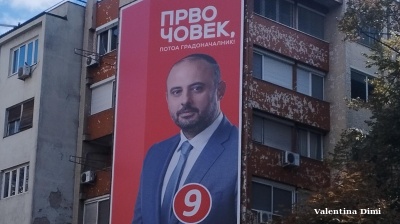29 Nato member states signed the accession protocol with the future North Macedonia on February 6, in a historic move for the tiny Balkan country which has waited for membership for more than a decade.
This was enabled after Macedonia signed a historic deal with Greece to solve the decades long name dispute in June last year, and particularly after the Greek parliament ratified the deal despite the strong opposition. Under the deal, the country will become North Macedonia and this will be effective as soon as Greece ratifies the accession protocol which is expected on February 8.
Before the deal, Greece had obstructed Macedonia's accession to Nato and the EU as it is opposed to the use of the name Macedonia because it has a province in the north with the same name. Greece blocked Macedonia from becoming a Nato member during the Bucharest summit back in 2008.
"Today is a historic day for your country," Nato secretary general Jens Stoltenberg said during the ceremony in the Nato headquarters in Brussels.
Stoltenberg said that Skopje’s accession would bring more security and stability to the region. He praised the country for its participation in the Nato-led peacekeeping mission in Afghanistan.
“I look forward to the day when 30 flags will fly outside NATO HQ," Stoltenberg said in a tweet following the ceremony.
He invited Macedonia's Defence Minister Radmila Sekerinska to attend the next Nato meeting as an observer.
Macedonian Foreign Minister Nikola Dimitrov, who signed the protocol, pledged that Macedonia will continue with reforms in all segments, including the army, and will increase its defence spending to 2% of GDP as early as this year.
He praised the political leaders from both sides, Athens and Skopje, for achieving the name agreement, which seemed impossible. Macedonia will change its name "in a matter of days" to North Macedonia, he added.
The protocol has to be ratified by all member states before Macedonia will officially become part of the Alliance.
Until then the future North Macedonia will have a seat in Nato as an invitee.
Recently, Dimitrov survived non-confidence motion launched by the opposition, which accused him of making a “harmful” agreement with Greece.
However, Nato and EU accession are strategic priorities for both the current government and the opposition.
The move is seen as a blow to Russia, which is trying to spread its influence in the Balkan countries and hamper their attempts to join Nato. Nearby Montenegro also recently became a Nato member.
News

Putin's meeting with Trump in Budapest is a slap in the face for the EU
As preparations get underway for a highly anticipated summit between Russian President Vladimir Putin and former US President Donald Trump in Budapest, attention is turning to an unusual but politically sensitive detail: how will Putin get there?

Zelenskiy leaves Washington empty handed, Trump and Putin head to Budapest to talk business
Ukrainian President Volodymyr Zelenskiy went into a White House meeting with US President Donald Trump on October 17 hoping for a big arms deal. He came out of the meeting empty handed.

Taiwan’s KMT elects new leader
Cheng Li-wun, the only female contender among six candidates, defeated former Taipei mayor Hau Lung‑bin by a wide margin, winning over 50% of the ballot in the leadership race for Taiwan’s opposition Kuomintang on October 18.

Gold price in Sri Lanka plunges
The sudden drop of around LKR20,000 in both 22- and 24-carat sovereigns adds to a volatile recent run for precious-metals pricing in the island nation: only days earlier, gold prices were noted to be climbing.




